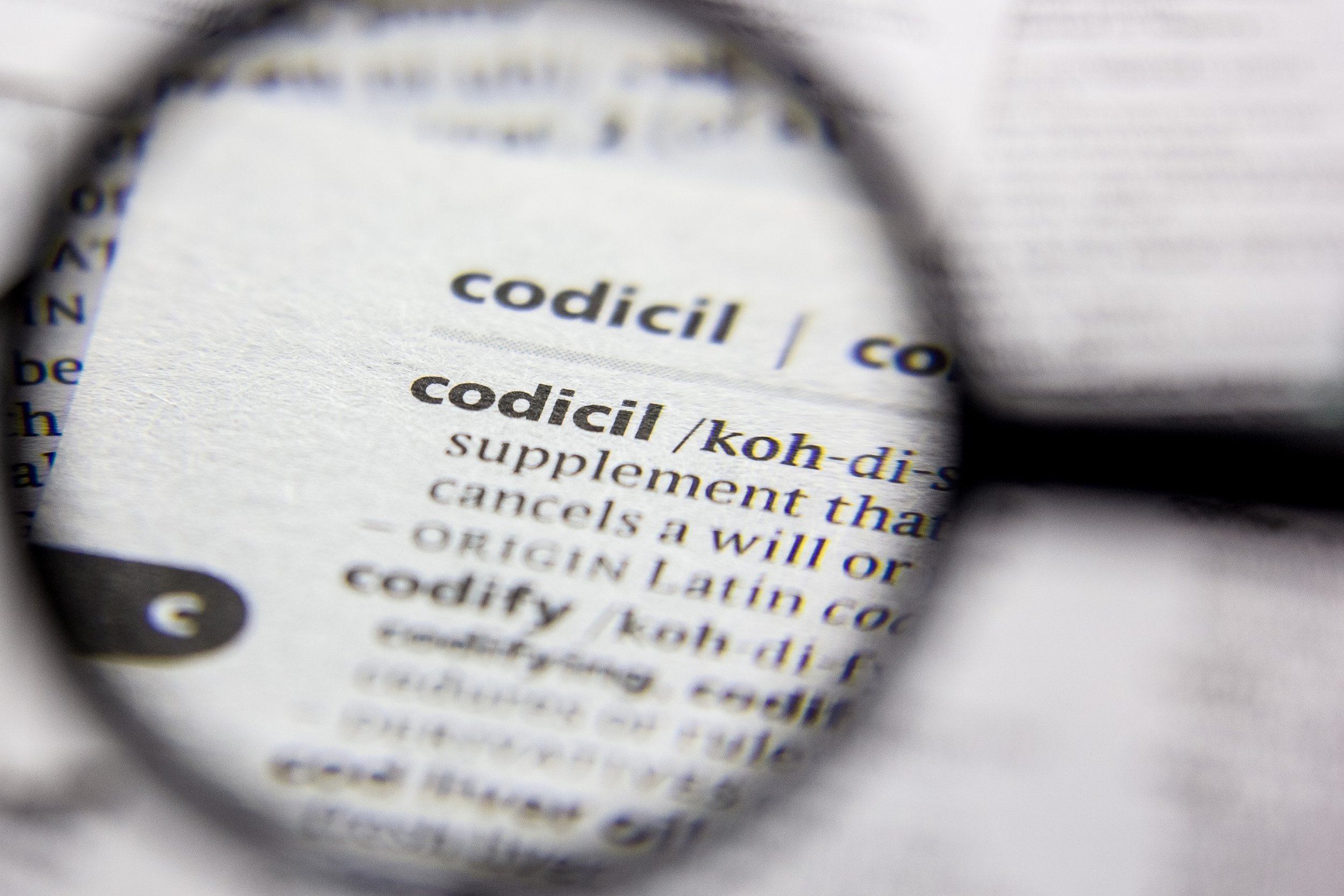Estate Planning Services
Everyday Options
For individuals and families looking for foundational estate planning tools to manage their assets, healthcare decisions, and personal wishes with simplicity and security. These options are great for those who want essential protections without complex planning.
-
Healthcare directives, more often than not, include documents like a living will and a healthcare power of attorney. A living will is a document that comes into play when a person is in a persistent vegetative state and deemed terminally ill. In your living will, you will designate what you would want to happen to you if you ever become terminally ill and deemed in a persistent vegetative state.
ADVANCED HEALTH CARE DIRECTIVE
HIPAA WAIVERS
-
A HIPAA authorization allows you to provide one or more individuals (including your agents or attorneys) access to your healthcare information. Medical professionals will require such an authorization in order to disclose any information to your loved ones.
REMEMBRANCE AND SERVICES MEMORANDUM
PERSONAL PROPERTY MEMORANDUM
-
One of the most difficult tasks we give our loved ones is the planning of our funerals. Already struck with the loss of you, now they are to engage in multiple transactions and hard decisions regarding the planning of your remembrance and memorial. Use this kit to set them up for success.
-
This document is more of a table/list than it is a memo. This tool allows you to designate specific tangible personal property to be gifted to specific individuals. This saves you time and expense. You won’t need to update your will every time you want to make a specific distribution (like jewelry or antiques) to one of your loved ones.
Deed Preparation and Recording
Certification of Trust / Trustee Affidavit
-
Add your real property directly to your trust.
If you own a home, land, or other real estate that you wish to place into your trust, our team can handle the legal process of preparing and recording a deed with the relevant county. This service ensures your real property is securely held within the trust, protecting it and helping streamline future management or transfer of the property.
-
A Certification of Trust is a legal document that provides key details about a trust without revealing the full trust agreement. It serves as proof of the trust's existence and verifies the trustee's authority to act on behalf of the trust. This document is often used when dealing with banks, financial institutions, or real estate transactions, allowing trustees to conduct business without disclosing sensitive terms of the trust.
A Trustee Affidavit is a sworn statement made by the trustee confirming their authority to manage the trust and carry out its terms. This document is commonly required by financial institutions, title companies, or third parties to ensure the trustee has the legal power to act. It may also include representations about the trust’s status, the powers granted to the trustee, and affirm that the trust remains in effect.
-
A will is crucial to have. A will allows you to communicate your wishes clearly and precisely. Currently, it is highly recommended that you work closely with an attorney to create and update your will. Without a will, the state in which you reside decides how to distribute your assets to your beneficiaries according to its laws. This is known as dying intestate, and the resulting settlement process may not produce the results that you would prefer for your survivors. You can prevent this from happening by having documents drafted that reflect your wishes.
A will generally includes:
•Designation of an executor, who carries out the provisions of the will.
•Beneficiaries—those who are inheriting the assets.
•Instructions for how and when the beneficiaries will receive the assets.
•Guardians for any minor children.
For assets that do not allow for the naming of beneficiaries (such as some bank accounts and real estate), the will is the place to designate who will get them, as well as any related special instructions.
Common misconception: people believe that if you have a will, you can avoid probate. Probate is the court administrative process used to distribute a deceased person’s assets and settle the deceased person’s debts. If you have a will upon your death, your executor will very likely need to use the probate (court) system in order to administer the deceased person’s estate.
Trust Funding Instructions
Standard will
-
Having a trust is step one. Many individuals pay attorneys for the trust document and once the trust is signed and delivered, they believe the work stops there. However, creating a trust is the FIRST step to using a trust as your estate planning vehicle. These trust funding instructions help ensure your trust is fully operational.
Affidavit Regarding Residence in Trust
Pour over Will
-
An Affidavit of Residence in Trust is a sworn statement confirming that a property held in a trust serves as the primary residence of the grantor or a beneficiary. This document is often used to establish eligibility for certain property tax exemptions, homestead protections, or other legal benefits tied to residency. It provides assurance to tax authorities, financial institutions, or other entities that the home remains occupied as required under applicable laws.
-
For individuals who utilize a living revocable trust as the center of their estate plan, a pour over will is strongly advised. A pour-over will is a testamentary device wherein the writer of a will creates a trust, and decrees in the will that the property in his or her estate at the time of his or her death shall be distributed to the Trustee of the trust.
Generally, the pourer will is a backup tool. It is used if a person forgot to put any assets into the trust. If someone has created a trust, that person should take extra special care to ensure all there assets are titled accordingly (or the trust is named as a beneficiary accordingly) so the trust is the owner of the assets during the life person or at the time of their death. A trust is the most preferred method for avoiding probate.
-
Do you have an existing will that accurately reflects your wishes, but worry about potential challenges after you're gone? An outdated will, even if legally sound, can be vulnerable to contests by beneficiaries who may claim it no longer represents your true intent. These challenges can lead to lengthy and expensive probate battles, draining your estate and causing undue stress for your loved ones.
Our Affirming Codicil service offers a simple, fast, and sophisticated solution to solidify your existing will and minimize the risk of future disputes. This specialized codicil acts as a powerful reaffirmation of your original will, leaving no room for doubt about your wishes.
-
Life changes. Your family grows, your assets shift, and your wishes may evolve. A Codicil to your Last Will and Testament offers a simple, cost-effective way to update your existing will without the need to create an entirely new document. Our Codicil service provides the professional guidance and support you need to make changes with confidence.
Assignment of Personal Property
Trust Restatement
-
A Trust Amendment is a legal document used to modify specific provisions of an existing trust without creating a new one. This allows the grantor to update terms such as beneficiary designations, trustee appointments, or distribution instructions while keeping the original trust intact. Trust amendments ensure that the trust remains aligned with the grantor’s wishes as circumstances change over time.
Trust Summary
Trust Amendment
-
A Trust Summary is a non-binding, easy-to-understand overview of your trust provisions, designed to help your loved ones navigate your estate plan without needing to interpret complex legal documents. This summary outlines key details such as the purpose of the trust, the roles of trustees and beneficiaries, and how assets are managed and distributed. While not a legally binding document, it serves as a helpful guide for family members and trustees, ensuring clarity and peace of mind when carrying out your wishes.
-
A Name and Fiduciary Summary is a convenient, non-binding reference sheet listing the individuals appointed to key roles in your estate plan. This summary identifies your trustees, executors/personal representatives, and agents under power of attorney, providing clarity on who is responsible for managing your affairs. Designed for easy understanding, it helps your loved ones quickly reference who has been entrusted with decision-making responsibilities without reviewing lengthy legal documents.
Name and Fiduciary Summary
-
A Trust Restatement is a legal document that completely updates and replaces the terms of an existing trust while keeping the original trust intact. Unlike a trust amendment, which modifies only specific provisions, a restatement allows for comprehensive changes without requiring a new trust to be created. This ensures continuity of the trust’s original creation date, preserving important legal and tax benefits while reflecting the grantor’s updated wishes.
-
An Assignment of Personal Property is a legal document that formally transfers ownership of personal assets—such as household items, jewelry, and other belongings—into a trust. This ensures that the assets are properly included in the trust for management and distribution according to the grantor’s wishes. By executing this document, the grantor confirms their intent to have these personal items governed by the trust, helping to avoid probate and streamline estate administration.
Advanced Planning
For individuals, families, and business owners with more complex needs, these strategies provide asset protection, tax advantages, and advanced estate planning solutions.
-
The revocable living trust is the most common estate planning tool today. A common misconception is that a trust is just for rich people. In fact, though, the trust better serves those that are trying to save money on administering a loved one’s estate when they pass. A trust allows you to designate one or more persons (trustees) who will (instead of a court) distribute your assets and pay your debts when you pass. That’s all a trust is: it is pretty much a private will.
-
A special needs trust (SNT), or sometimes called a Supplemental Needs Trust, is a trust that will preserve the beneficiary's eligibility for needs-based government benefits such as Medicaid and Supplemental Security Income (SSI). Because the beneficiary does not own the assets in the trust, he or she can remain eligible for benefit programs that have an asset limit.
Assignment of Business Interests or Equity
Nevada-Domiciled Domestic Asset Protection Trust
-
An Assignment of Business Interests or Equity is a legal document that transfers ownership of a business interest—such as shares in a corporation, membership units in an LLC, or partnership interests—into a trust. This ensures that the business assets are properly included in the trust for management, succession planning, and distribution according to the grantor’s wishes. By executing this assignment, the grantor helps avoid probate and ensures a smooth transition of business ownership.
-
An Asset Protection Trust is an irrevocable trust that’s often created to protect the beneficiary from the potential negative consequences associated with transfer tax laws, divorce settlements, and bankruptcy regulations. More and more domestic and international families are establishing Asset Protection Trusts in Nevada. Nevada Asset Protection Trusts include a Spendthrift Provision that prevents beneficiaries and potential creditors (including previous spouses) from gaining direct access to assets within the trust.
Nevada Self-Settled Spendthrift Trusts, also referred to as Domestic Asset Protection Trusts, allow a grantor to place assets into an irrevocable trust and remain a beneficiary of that trust. The state statutes require the use of an independent trustee before distributions can be made to the grantor.
-
A decentralized autonomous trust is an estate planning tool that harnesses the stability, privacy, and security of blockchain technology. These trusts are constructed by rules encoded as a computer program that allows for decentralized trust administration for crypto currency assets and NFT (non-fungible tokens). With a decentralized trust, you don’t get just one trustee. You get millions of trustees, incorruptible due to the transparency of the blockchain.
Decentralized Autonomous Trust
Family Limited Partnerships
-
A family limited partnership (FLP) is a holding company owned by two or more family members, created to retain a family's business interests, real estate, publicly traded and privately held securities, or other assets contributed by its members. The purpose of creating such an entity is generally to achieve creditor protection and reduce gift and estate taxes while maintaining control over the management and distribution of the partnership's assets.
-
A qualified personal residence trust (QPRT) is a specific type of trust that allows its creator to remove a personal home from their estate for the purpose of reducing the amount of gift tax that is incurred when transferring assets to a beneficiary.
Qualified personal residence trusts allow the owner of the residence to remain living on the property for a period of time with "retained interest" in the house; once that period is over, the interest remaining is transferred to the beneficiaries as "remainder interest."
Qualified Personal Residence Trust
Retirement Trust
-
A retirement trust is a strategy where you name your trust as the beneficiary of your retirement accounts. This offers the best of both worlds. The tax benefits of a retirement account and the protection of a trust.
A retirement trust is a good idea for investors who have sizeable retirement account balances and want to control the distribution of those funds through a trust. These accounts also offer numerous protections for average investors that can ensure that your estate doesn’t lose your lifelong savings to a lawsuit, bankruptcy, divorce or spendthrift beneficiary.
-
A gun trust is the generic name for a revocable or irrevocable management trust that is created to take title to firearms. Revocable trusts are more common, as they can be amended and changed during the lifetime of the grantor.
Although any legally owned weapon can be placed into a gun trust, these trusts are specifically used for weapons that are classified under the National Firearms Act (NFA) Title II of the Gun Control Act of 1968. Examples of Title II weapons include a fully automatic machine gun, a short-barreled shotgun or a suppressor, sometimes called a “silencer.” The latter is a common piece of equipment that is purchased and owned by a gun trust. The trust is actually the owner of the firearm or suppressor.
-
Oh, how we love our furry friends. But how do we take care of them when we are gone? A pet trust is the best way to ensure your pets are taken care of. The pet trust designates a caretaker and a trustee (the person with the money). This relationship established by the trust between trustee and caretaker ensures that there are checks and balances when it comes to your pets needs.
-
Grantor-retained trusts are irrevocable trusts created to reduce estate taxes. With each, the grantor receives some form of income from the trust for a set amount of years, and then the property is transferred to a beneficiary free of estate taxes. These trusts are used mostly by wealthy individuals to limit estate and gift taxes because they create these trusts with high-growth assets which do not incur taxes on the increased value of the assets during the life of the trust.
Grantor Retained Trust
-
A Durable Financial Power of Attorney is a document that lets you appoint someone (known as your “agent”) to manage your finances for you if you ever become unable to do so for yourself.
The agent is much like an employee: just because you give them access to the cash register, doesn’t mean you are giving them the cash. The agent has what we call “fiduciary duties.” This means, generally, that the agent has to exercise loyalty and care when they manage the assets for you.
This power of attorney, if done correctly, can assist a client from having a court-appointed conservator (much like what happened to Brittany Spears). The power of attorney allows you to privately designate an individual you trust to assist you with managing your household when you are unable to do so. If you do not privately designate someone, you could be subject to someone the court appoints for you.
Simple trust
-
Retain us as your planning attorneys now and save with our simple trust. Easy online setup, affordable pricing, and expert support. Protect your loved ones and avoid probate court. Our simple trust ensures your assets are distributed according to your wishes, avoiding costly legal battles and protecting your family during a difficult time.































